25th December 2020
AI-CD Secretariat Support Team
Overview
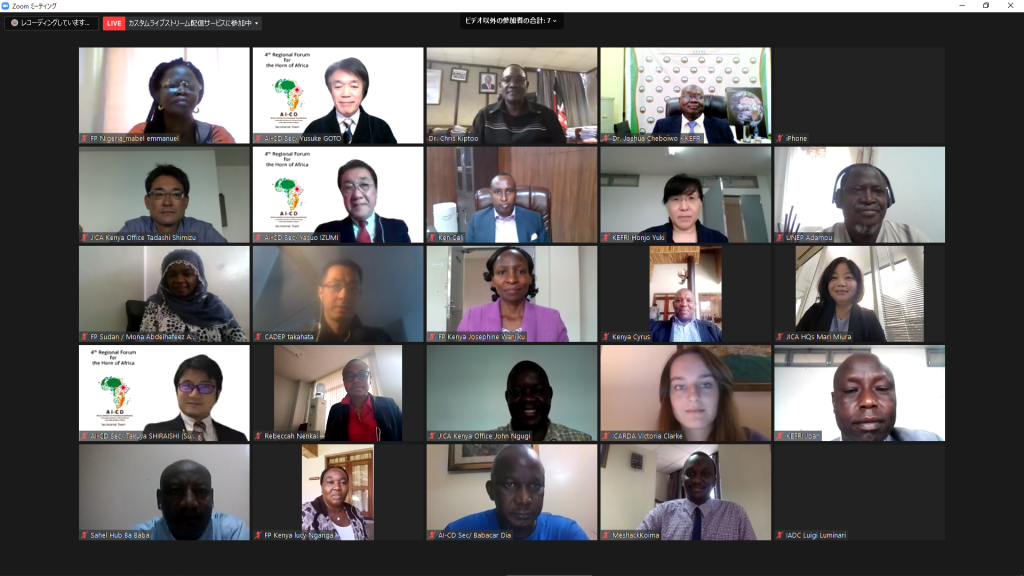
Under the COVID-19 pandemic, all the activities for the African Initiative for Combating Desertification to Strengthen Resilience to Climate Change in the Sahel and Horn of Africa (AI-CD) have been implemented online. To share the progress and discuss the way forward, the fourth Horn of Africa (HoA) Regional Forum on AI-CD was held virtually on December 9th, 2020, chaired by Kenya as the regional Hub. The Forum welcomed around 45 participants that were composed of the Focal Points (FPs) of Kenya, Somalia, Sudan, South Sudan, Nigeria and Eritrea ; International Technical and Financial Partners (ITFPs) including UNCCD, FAO, ICARDA, UNEP, UNDP, and World Bank; Regional Hub of the Sahel (Senegal FP); representatives from the Ministry of Environment and Forestry of Kenya, Kenya Forestry Research Institute (KEFRI) and JICA; and the AI-CD Secretariat.
One of the highlights of the Forum is that member countries expressed their strong will to continue their initiatives to promote AI-CD relevant activities, such as realization of project ideas through access to finance and knowledge sharing activities with support from the hub country, AI-CD Secretariat and ITFPs.
1 The Focal Point of Eritrea attended through YouTube Live Streaming.
HIGHLIGHTS OF THE FORUM
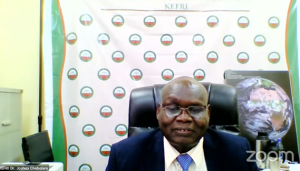
Dr. Joshua Cheboiwo, Director of KEFRI
At the opening session, the Director of Kenya Forestry Research Institute (KEFRI), Dr. Joshua Cheboiwo, welcomed the participants and shared the programme of the Forum.
Following a brief introduction to the Forum’s objectives which are providing opportunities for Networking and Knowledge Sharing to enhance Access to Finance by the AI-CD Secretariat, the Focal Point of Kenya, Mr. Cyrus Mageria, expressed his warm welcome to the participants, introduced a brief history of AI-CD, and concluded by underlining the necessity to work together, develop a network and share our knowledge to tackle the issues in the HoA region which are deforestation, loss of sufficient food and drought, through the management of natural resources.
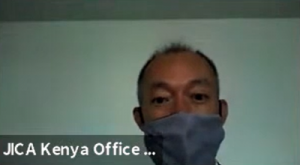
Mr. Tomoyuki Yasuda, Senior Representative of JICA Kenya Office
The Senior Representative of JICA Kenya Office, Mr. Tomoyuki Yasuda, mentioned that four years ago when AI-CD was launched, deforestation was identified as one of the biggest challenges, and half of the African continent was affected by the phenomenon which justifies combatting desertification and using the terrestrial ecosystems sustainably. He took stock of what has been done for each of AI-CD’s three pillars and concluded his speech by pointing out his hope to see the objectives assigned to combating desertification be achieved in the Sahel and Horn of Africa.
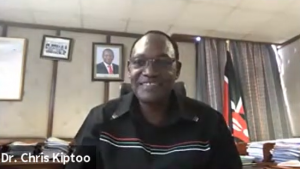
Dr. Chris Kiptoo, Principal Secretary of the Ministry of Environment and Forestry of Kenya
The Principal Secretary of the Ministry of Environment and Forestry, Dr. Chris Kiptoo, welcomed everyone and reminded them of how challenging it is for natural resource managers to discuss how to combat desertification and mitigate climate change effects. In this regard, there is a great commitment of African countries because of the population being larger, the fact that Africa is the most affected continent by desertification, the large use of wood, and inadequate information and knowledge. He continued that to face this situation we need to develop projects, and that is why he placed a big hope on the outcomes of the Forum. Concerning Kenya, he shared with the audience that its NDC (National Determined Contribution) has been updated and is a reference for the next 10 years. To carry out significant actions in accordance with this NDC, the support of JICA and other ITFPs is needed, concluded the Principal Secretary.
(1) Progress of AI-CD activities by member countries and AI-CD Secretariat
✔ AI-CD Secretariat explained the progress and way forward of AI-CD in relation to its three pillars: Networking, Knowledge Sharing and Access to Finance.
✔ On behalf of the Focal Point of Kenya, Chief Research Scientist of KEFRI, Dr. Michael Mukolwe mentioned, as their achievements, three Regional forums, two Regional Technical Training workshops for Building Network, the use of Internet and non-Internet based methods for Knowledge sharing, and a Project Concept Note (PCN) whose title is « Institutional Capacity Building on Forestry research Information » elaborated as part of the Access to Finance pillar.
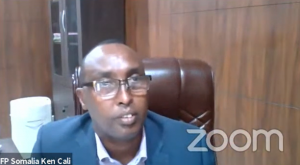
Mr. Kenadid Mumin Cali, Focal Point of Somalia
✔ The Focal Point of Somalia focused his presentation on « Combating Desertification in Somalia ». He showed the impact of the charcoal production and how it expanded from the year 2000 onwards, the objectives of the programme elaborated to address the problem and finally presented the related PCN.
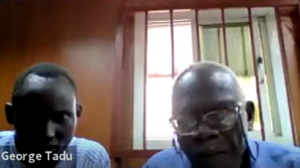
Dr. George Louise T. Tadu (right), Focal Point of South Sudan
✔ The Focal Point of South Sudan presented a project titled « Integrated farming to combat desertification in peri-urban areas in South Sudan » whose overall objective is to build the resilience of smallholder farmers in peri-urban areas to cope with the effects of droughts and desertification.
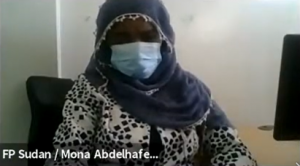
Dr. Mona Abdelhafeez Ahmed Dawelbait, Focal Point of Sudan
✔ The acting Focal Point of Sudan focused on the New Governmental setup for the Desertification Institution and the Relative items in the updated SNAP (Sudan Action Program for Combating Desertification), which explained the quintessence based on the Sustainable Development Goal 15 of the Agenda 2030, Paragraph 33 of the 2030 Agenda for Sustainable Development, and Paragraph 205 of the Future We Want. The SNAP has 4 components, aims to increase food production, decrease the out-migration of youth, and create employment opportunities, for the benefit of local communities.
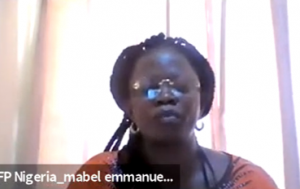
Ms. Mabel O. Emmanuel, Focal Point of Nigeria
✔ The Focal Point of Nigeria emphasized how the political will is important for achieving the AI-CD main objective. She went through their achievements in each AI-CD pillar and finished her intervention by introducing to the overview of Desertification in Nigeria and the six actions that the Government is carrying out to strengthen rural communities.
✔ The acting Focal Point of Senegal, as the representative of the Sahel Hub, expressed his pleasure to participate in the Forum, thanked HoA colleagues for inviting the Sahel Hub and JICA for their constant and multiform support. He finished his speech by drawing attention to the necessity to accelerate AI-CD activities in the Sahel Region while we are heading the end of the AI-CD time frame. To face that situation, he proposed a review mission to see how to make progress.
(2) Questions and answers
✔ UNEP Representative explained that his institution is supporting 193 countries in NAPs (National Action Plans) development and is collaborating with the Great Green Wall and CILSS/Agrhymet.
(3) Strategy of ITFPs relevant to AI-CD Agenda and progress by AI-CD partners
✔ The representative from the World Bank (WB) explained that their focus for the HoA region was on « Combating Drought and Desertification to Enhance Resilience ». After stating that HoA is one of the world’s most challenging regions for security and development, the presenter discussed the climate context, the climate risks and land degradation threatening development gains, elements of good practices (i.e., Case studies in Kenya and Ethiopia). He added that 70% of WB’s activities toward Combating Desertification and Drought are in rural development and 55 out of 100 projects are in Africa.

Ms. Victoria Clarke, ICARDA
✔ The presentation of ICARDA’s Representative was on « Databases and Knowledge Sharing ». She pointed out that the partnerships between AI-CD and ICARDA are for knowledge sharing to enhance development effectiveness and explained the Goal, Purpose, and Audience of the Databases, Documentation Process, technology or approach as well as the forms of Knowledge Sharing.
✔ FAO representative delivered his presentation on FAO’s contribution to expanding Africa’s Great Green Wall (GGW) in terms of Biophysical Data collection and Management. He informed that the restorable land in the GGW Sahel is 161.7 million hectares, 6.3% is the average net tree cover increase in the GGW area.
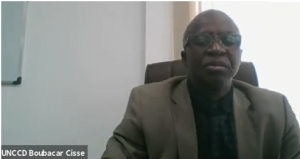
Mr. Boubacar Cisse, UNCCD
✔ UNCCD’s presentation was focused on « Knowledge and experiences related desertification, climate change and land degradation in Sub-Saharan Africa ». The presenter discussed the occurrence and impact of DLDD (Desertification, Land Degradation and Drought) in Africa, the African actors, and stakeholders on combating DLDD and the Chronology of the implementation in Africa.
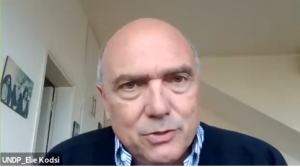
Mr. Elie Kodsi, UNDP
✔ UNDP representative talked about their large-scale capacity building project to be launched. He also suggested that the AI-CD approach could be strengthened within its facilitating role by assisting member countries to integrate their project ideas/concepts into large programmes to enhance Access to Finance.
✔ UNEP works on GEF to implement indicators supporting LDN (Land Degradation Neutrality), aims to train Focal Points at the regional level and supports the GGW Initiative.
(4) Synthesis and Way Forward
✔ Facilitated by KEFRI and AI-CD Secretariat, the participants confirmed the way forward of each actor in accordance with AI-CD’s three pillars. Above all, member countries confirmed to continue their initiatives to promote AI-CD relevant activities, such as realization of project ideas through access to finance and activities for knowledge sharing with support from the hub country, AI-CD Secretariat and ITFPs, and share its progress at the next/final forum in 2021.
Closing remarks by KEFRI and JICA brought the Forum to a close.

